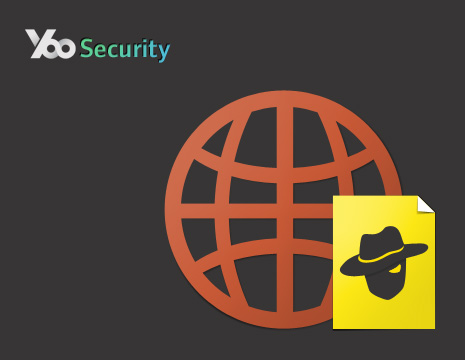Technological advances over the last two decades have allowed people to be connected at all times, and have opened up access to a whole new world – a virtual world where anything you could ever need is essentially a click away. The digital age can be defined in one word: convenience. Sometimes this can be a good thing, but other times this increase in ease and convenience can create serious problems for you in the end.
The Internet was once dubbed, “the information superhighway” because it contains an endless abyss of information, services, and items all organized in the vast expanse known as the World Wide Web. New users of the internet are blown away by the whole new world available at their fingertips. Unfortunately, people get so wrapped up in the convenience of the Web; they often do not consider the potential dangers that can arise as well.

Cyber crime is the general term used to define any criminal action that takes place through the internet. This includes an infinite number of online scams designed to rob innocent people by selling a fake product or service. Cyber criminals and online scam artists have developed, and continue to develop, elaborate scams that prey on the weakness and desperation of individuals who are vulnerable enough to fall for their tricks. There are many types of these scams on the Internet, like My computer is blocked scam, PC Blocked Moneypak virus, FBI virus scam, fake AV File Restore virus scam, the hijacked Claro Search redirect virus, MyStart by IncrediBar toolbar hijack, the commercial-oriented System Progressive Protection virus scam, ICE Cyber Crimes Center virus, Internet Crime Complaint Center virus and the nationwide spreading Ukash virus scam. The ultimate goal of these virtual con artists is to take your money, whether you hand it over willingly or they steal your personal information and go take it for themselves. To them, it doesn’t matter so much how they get it, as long as they get it.
If you want to keep your identity and personal information safe from online scam artists and cyber criminals, you must learn to recognize the characteristics of common internet scams. The warning signs associated with an online scam are usually pretty glaring, but sometimes you can lose sight of this and make a decision you wouldn’t normally make. Internet scam artists are notorious for trying to confuse people and typically use very strong, persuasive language to sell their product or service. If you have been tempted by an advertisement on the internet that sounds too good to be true, chances are it is an online scam designed to lure you in.
This article will cover some of the most common online scams so that you can recognize them and avoid their glittery promises at all costs. We’ll also provide you with tips on what you can do to make sure you never become the victim of a dangerous cyber criminal. By following these tips, you will keep your personal identity and hard earned cash safe and secure.
If you are a scam victim and looking for quick solutions on how to deal with these scams, you can consult YooSecurity professionals online. Our professionals are working 24/7 per day for any your consultation either via online chat or toll free call.
What are Top Online Scams
1. Debt Relief or Consolidation Scam – One of the easiest ways to get someone to listen to you is to promise them an answer to their financial burdens. So many people struggle to get by and are up to their ears in debt. Some are so desperate; they will try just about anything. Online scam artists are keenly aware of this weakness and work very hard to take advantage of people who are down and out. Remember, if it seems too good to be true, it probably is. These debt relief scams offer nothing valuable to someone seeking a real answer. Typically, the debt relief touted in advertisements turns out to be nothing more than bankruptcy. If you get tricked into claiming bankruptcy, you will most likely be slapped with hefty legal fees. Furthermore, a bankruptcy claim stays on your credit report for 10 years. Some debt relief, right?
2. Wonder Drugs – Another subset of the population desperate for an answer to their problems are people suffering from some type of ailment. Whether it is internal, external, major, or minor, people who suffer from something will jump at the opportunity to fix whatever it is that is wrong with them. You know you have seen the ads on late night TV offering some form of miracle drug that is guaranteed to get rid of your ailments. These ads usually feature doctors (actors dressed as doctors), and a diverse sampling of satisfied customers who can attest to the amazing results of the wonder drug. Don’t fall for it! These claims are usually false and the drugs offered are potentially very dangerous. This is because the supplements are not approved by the Food and Drug Administration, which means their effects are unknown and unproven.
3. Financial Investment Opportunity Scam – Get in on a once in a lifetime investment opportunity that is guaranteed to double, triple, or even quadruple your returns. This is the message behind investment scams that claim to offer you a chance to provide your financial backing for a new business. The schemers behind scams like this will tell you there is no risk involved and will present you with very convincing argument for why this investment will change your life forever. This scam reels in “investors,” takes their money, and provides absolutely nothing in return. There is no product, no business, no stellar returns, nothing. Once you give these con artists money, you will never hear from them again. And forget about trying to locate them. They will be off the grid, operating a new scam before you know it.
4. The Revolutionary Weight Loss Scam – The results are incredible. Over 1 million people have tried the so-called bogus weight loss system and achieved their weight loss goals. They now live healthy lives, have beautiful spouses, and lots of wealth. This is the image painted by crooks that operate weight loss scams. These promises of weight loss are usually attached to some brand new diet, pill, or program, and they are usually false. Advertisements display before and after pictures of regular people just like you who have improved their life just by trying the revolutionary weight loss system. This is another scam that targets the insecurities and desperation of overweight people who struggle with their eight on a daily basis and will do anything to shed the pounds and feel normal again. There is no miracle drug or diet that can result in dramatic weight loss.
5. The Work-at-home Scam – Imagine if you could work from the comfort of your own home and bring in the salary of a big time executive. Who wouldn’t want to take advantage of an opportunity like this? That is exactly what the scam artists behind work-at-home schemes hope you will say. This popular online scam definitely falls under the “way too good to be true” category. The advertisements conveniently fail to mention the fact that you typically need to provide some sort of start-up capital out of your own pocket before you can begin to reap the benefits of working from home. Sure, you may be your own boss, but these work-at-home scams are nothing more than glorified sales positions. You will work around the clock and probably have little to show for it at the end of the day. Your cubicle isn’t sounding so bad anymore, is it?
6. Fake Software Scams and Hijackers – The malicious software authors are publishing more software scams and hijackers than ever to obtain commercial profits by using more and more social engineering techniques like pretending they are authorities and extort victims for ransoms to unlock locked computers or deceive the victims into buying the fake licenses of the installed software. YooSecurity Labs has detected and removed these latest scams like FBI virus is widely spreading over the nation and asking for fees to unlock locked computer; the File Recovery latest variant File Restore virus is locking your computer for ransom; the nasty browser hijacker Claro Search virus is redirecting your browser to claro-search.com; another infamous browser hijacker MyStart by IncrediBar toolbar hijacks all your browser sessions to Mystart.Incredibar.com for commercial interests; System Progressive Protection virus as well as the Ukash virus scam are widely “taking profits” on the victims.
How to Avoid Online Scams
As long as the Internet exists, so will online scams. You can be sure that cyber criminals will continue to create crafty, clever ways to fool innocent people out of their money, but you do not have to be one of them. As long as you pay attention, read carefully, and use a little bit of common sense, you can avoid becoming the unfortunate victim of an online scam. Listed below are five important facts you need to know to prevent an online scam artist from taking advantage of you.
1. Identify the source – You don’t give money to every stranger you meet on the street, right? So why should you be so willing to hand over your money to strangers on the internet? Anybody can set up a bogus web site and sell a fake product or service without any sort of credentials or certifications. All they have to do is sound convincing enough to trick innocent people into buying whatever it is they are selling. The anonymity of the internet can be a great feature if you are dealing with sensitive subject matter and want to remain discreet, but on the other hand, the virtual nature of the web can create problems when you begin to deal with people you know nothing about. If you are making a transaction on the web and you cannot seem to find any identification information for the person who is asking for your money, the red flags should go up. If someone is not willing to be transparent on the web, then they probably have something to hide.
2. Understand the Transaction Terms – Shady transactions on the internet usually appear in the form of wiring money. You should be aware that wiring money is an extremely risky way to provide payment for a product or service. Essentially, wiring money is just like sending cash to someone. It is virtually untraceable and the paper trail is minimal. This is why online scam artists try to force you to wire money for payment. When they get the money, they take off and you will never hear from them again. Nor will you receive whatever product or service you thought you purchased. You should only use websites that offer verified payment methods. If you are dealing with an individual, you should always use a trusted source like PayPal to conduct any monetary transactions.
3. Discuss weight loss supplements or other health related products with your doctor –Aside from being a complete rip off, bogus weight loss products sold by unknown sources on the web can be potentially harmful to your health. If you are tempted to try a weight loss product that offers you a permanent weight loss solution, you should really talk to your doctor or other health care professional before putting any substances into your body. There is no shame is being interested in a new weight loss product if you struggle with your weight, but you always want to make sure you are going about things in a healthy way. Just think twice before trying weight loss products. These are common online scams that are never worth the risk.
4. Don’t ever give out your personal information to and unknown source –Phishing is a popular scam used by cyber criminals looking to obtain your personal information so they can steal your identity. In these online scams, you will receive an email that looks like it comes from an official entity or institution requesting your personal information. Online scam artists have the ability to mirror email design templates to make them look real, when in fact, they are nothing more than fake forms. Phishing is one of the most dangerous and popular types of online scams. If you receive an email asking for personal information, you should always verify with the source to find out if it is official or not.
5. Think Before You Act – The best way to avoid becoming the victim of an online scam is to be aware and pay attention to the pages you visit on the web. Even though hackers and scam artists are getting quite good when it comes to masking their scam sites look like legitimate sites, there are always obvious signs and characteristics that point to an online scam. These signs typically relate to the payment request made by the web site, company, or individual associated with the scam. If you take a moment and think before you act, you should be able to spot the inconsistencies that are inevitable in an online scam situation.
Although there are very valid threats lurking all over the internet, this should not dissuade you from taking advantage of everything the web has to offer. Having so many options available to you in this grand virtual marketplace is a wonderful thing, as long as you know how to use it correctly. Follow your gut when it comes to making transactions online. If something doesn’t feel right, don’t pursue it.
Friendly reminder: Online scams are more and more prevalent nowadays. If you are still not sure how to identify or how to deal with these activities, please contact YooSecurity professionals for help.
Published by YooSecurity CTO & last updated on May 30, 2013 11:21 am













Leave a Reply
You must be logged in to post a comment.